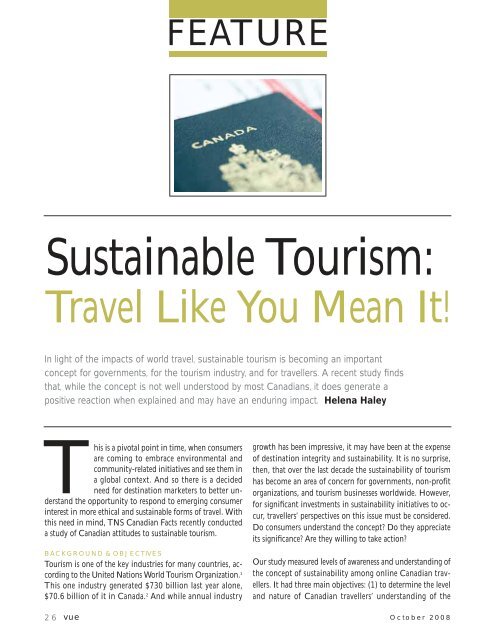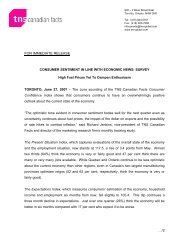Article: Sustainable Tourism — Travel Like You Mean It - TNS Canada
Article: Sustainable Tourism — Travel Like You Mean It - TNS Canada
Article: Sustainable Tourism — Travel Like You Mean It - TNS Canada
Create successful ePaper yourself
Turn your PDF publications into a flip-book with our unique Google optimized e-Paper software.
This is a pivotal point in time, when consumers<br />
are coming to embrace environmental and<br />
community-related initiatives and see them in<br />
a global context. And so there is a decided<br />
need for destination marketers to better understand<br />
the opportunity to respond to emerging consumer<br />
interest in more ethical and sustainable forms of travel. With<br />
this need in mind, <strong>TNS</strong> Canadian Facts recently conducted<br />
a study of Canadian attitudes to sustainable tourism.<br />
BACKGROUND & OBJECTIVES<br />
<strong>Tourism</strong> is one of the key industries for many countries, according<br />
to the United Nations World <strong>Tourism</strong> Organization. 1<br />
This one industry generated $730 billion last year alone,<br />
$70.6 billion of it in <strong>Canada</strong>. 2 And while annual industry<br />
FEATURE<br />
<strong>Sustainable</strong> <strong>Tourism</strong>:<br />
<strong>Travel</strong> <strong>Like</strong> <strong>You</strong> <strong>Mean</strong> <strong>It</strong>!<br />
In light of the impacts of world travel, sustainable tourism is becoming an important<br />
concept for governments, for the tourism industry, and for travellers. A recent study finds<br />
that, while the concept is not well understood by most Canadians, it does generate a<br />
positive reaction when explained and may have an enduring impact. Helena Haley<br />
growth has been impressive, it may have been at the expense<br />
of destination integrity and sustainability. <strong>It</strong> is no surprise,<br />
then, that over the last decade the sustainability of tourism<br />
has become an area of concern for governments, non-profit<br />
organizations, and tourism businesses worldwide. However,<br />
for significant investments in sustainability initiatives to occur,<br />
travellers’ perspectives on this issue must be considered.<br />
Do consumers understand the concept? Do they appreciate<br />
its significance? Are they willing to take action?<br />
Our study measured levels of awareness and understanding of<br />
the concept of sustainability among online Canadian travellers.<br />
<strong>It</strong> had three main objectives: (1) to determine the level<br />
and nature of Canadian travellers’ understanding of the<br />
26 vue October 2008
sustainability concept, both implicitly<br />
and explicitly; (2) to measure the depth<br />
of their commitment to sustainability;<br />
and (3) to reveal whether there is support<br />
among Canadian travellers for sustainable<br />
business practices in tourism.<br />
METHODOLOGY<br />
To obtain the trend information, we<br />
conducted two nationally representative<br />
Internet surveys. The first survey, of<br />
1,079 online Canadian travellers (those<br />
who have taken an overnight pleasure or<br />
vacation trip in the past two years or<br />
claim an intention to take such a trip in<br />
the next twelve months), all 18 years of<br />
age and older, was conducted July<br />
18–22, 2007. The second survey was of<br />
1,180 online Canadian travellers 18<br />
years and older, conducted March<br />
12–17, 2008. Respondents were randomly<br />
selected from the <strong>TNS</strong> Canadian<br />
Facts Internet access panel (comprising<br />
100,000 Canadian adults) and were<br />
asked to visit our website to participate<br />
in the study. Completions were weighted<br />
by key demographics – region, age, gender,<br />
income and education – to represent<br />
the Canadian online population.<br />
As part of this analysis, we undertook a<br />
segmentation exercise to isolate forwardlooking<br />
shapers of future travel trends<br />
using the FutureView model. This<br />
model is specifically designed to identify<br />
people who will shape the future of<br />
consumer demand and interest. The resulting<br />
analysis established the degree to<br />
which interest in sustainable travel is enduring<br />
and likely to become a mainstream<br />
motivator over the longer term.<br />
FINDINGS<br />
Nearly two-thirds of Canadian travellers<br />
say they are concerned about<br />
global warming, the loss of natural<br />
habitats and ecosystems, and the use of<br />
child labour in developing countries.<br />
But the question remains: Does this<br />
mean that Canadian travellers are willing<br />
to change their travel behaviours on<br />
the basis of these concerns?<br />
FEATURE<br />
Currently, the concept of sustainable<br />
tourism is not well understood among<br />
consumers. Only 8 per cent of Canadian<br />
travellers claim to be very or fairly<br />
familiar with it (with no evident change<br />
in that level between 2007 and 2008).<br />
This figure is low by any standard.<br />
Other tourism concepts generate much<br />
higher levels of claimed familiarity<br />
(25% in the case of adventure tourism,<br />
for instance).<br />
However, the concept of sustainable<br />
tourism does generate a positive reaction<br />
among consumers when they are<br />
given a definition – “tourism that respects<br />
the local environment, culture,<br />
people, and economy.” More than 8 in<br />
10 Canadian travellers (83% in 2007<br />
and 86% in 2008) agree that sustainable<br />
tourism practices would have a<br />
positive effect on the world’s future. In<br />
other words, while appreciation of the<br />
concept is currently underdeveloped,<br />
and while there is likely some yea-saying<br />
associated with environmental issues,<br />
it is quite possible that the issue of<br />
sustainability will have a significant impact<br />
on future decision-making, behaviour,<br />
and marketing plans in the<br />
tourism sector.<br />
Many Canadian travellers express a willingness<br />
to take personal action. Onethird<br />
say that they would switch from a<br />
preferred holiday destination to one<br />
that supported sustainable tourism,<br />
while 4 in 10 would try to find and use<br />
a travel agency that adheres to environmental<br />
guidelines. And over one-quarter<br />
(28% in 2007 and 27% in 2008) say<br />
they would pay a premium for an ethical<br />
and sustainable holiday.<br />
These numbers are slightly higher than<br />
what <strong>TNS</strong> reported for Europe and the<br />
U.S.A. in the Green <strong>Travel</strong> survey (November<br />
2007). An impressive 32% of<br />
<strong>It</strong>alians claimed a willingness to switch<br />
to more ethical, greener vacations, in<br />
contrast to only 16% of Americans. In<br />
Britain, 7% of the travellers have actually<br />
gone so far as to make a payment<br />
towards minimizing the impact of their<br />
travelling; in Spain, 12% have done so.<br />
In light of these figures, it is quite likely<br />
that many Canadians will be receptive<br />
to appeals that minimize the environmental<br />
impacts of travel.<br />
As illustrated by the <strong>TNS</strong> study, Canadian<br />
travellers believe that multiple<br />
stakeholders share the responsibility for<br />
activating demand for sustainable<br />
tourism. Three-quarters believe that<br />
both the mass media and businesses<br />
which market and sell tourism should<br />
ensure that information and sustainable<br />
choices are made available to travellers.<br />
Almost two-thirds believe that government<br />
has an important role to play in<br />
educating its citizens about the necessity<br />
of adopting sustainable tourism<br />
practices. And, finally, two-thirds of<br />
travellers feel that it is ultimately the<br />
travelling public that occupies the locus<br />
of control and that travellers themselves<br />
must take responsibility for<br />
planning travel with sustainability in<br />
mind.<br />
One of the interviewed travellers had<br />
this to say. “<strong>Sustainable</strong> tourism is the<br />
optimal use of natural and cultural resources<br />
for national development on an<br />
equitable and self-sustaining basis to<br />
provide a unique visitor experience and<br />
an improved quality of life through<br />
partnership among government, the<br />
private sector, and communities.”<br />
<strong>It</strong> is clear that consumers do not see<br />
themselves as standing alone in an effort<br />
to push the sustainability endeavour<br />
forward, but rather see a need for various<br />
stakeholders to work cooperatively<br />
in this effort. Undoubtedly, engaging<br />
consumers and making environmentally<br />
friendly choices readily available to<br />
the public will raise the profile of the<br />
sustainability concept.<br />
vue 27
Finally, the reactions of FutureShapers TM<br />
(the trendsetters and the most important<br />
group of consumers with respect to<br />
future market potential) suggest that<br />
sustainable tourism will grow as an enduring<br />
concern. First, the concept of<br />
sustainable tourism appeals very strongly<br />
to trendsetters within the leisure travel<br />
category. These travellers are, by definition,<br />
most likely to initiate a given trend<br />
and pull this behaviour into the mainstream<br />
over the longer term. Second,<br />
FutureShapers TM also exhibit accelerated<br />
growth in understanding and appreciation<br />
of the sustainable tourism concept.<br />
IMPLICATIONS<br />
Issues fostering the need for a strategy<br />
of sustainable tourism are of widespread<br />
concern to Canadians. However, the<br />
majority do not immediately link these<br />
issues to tourism-related causes or solutions,<br />
nor do they necessarily appreciate<br />
the direct impact of tourism on the deterioration<br />
of important natural and<br />
historic sites worldwide.<br />
Further, we do not observe a statistically<br />
significant increase in travellers’ concern<br />
for sustainable tourism initiatives since<br />
July of 2007. Why? Let us entertain just<br />
a few possibilities.<br />
The year 2007 has been noted as “the<br />
year when everyone jumped on the environment<br />
bandwagon,” 3, cf. 4 Al Gore’s An<br />
Inconvenient Truth: The Planetary Emergency<br />
of Global Warming and What We<br />
Can Do About <strong>It</strong> was at its peak popularity.<br />
By early 2008, people were likely suffering,<br />
to some degree, from information<br />
overload and “eco-fatigue” 4 and were beginning<br />
to turn their attention to other<br />
FEATURE<br />
concerns. Confusion and skepticism<br />
about ameliorative actions such as carbon<br />
offsetting have grown, in no small<br />
part as an outcome of the fragmented<br />
and deregulated industry practices enforcing<br />
it. We also have to look at the<br />
Canadian government, which continues<br />
to take a passive role in championing environmental<br />
issues and provides limited<br />
regulatory enforcement. As a consequence<br />
of all these factors, there is no<br />
perceived urgency to the good intentions<br />
expressed by Canadian consumers and<br />
limited inclination to incur immediate<br />
personal costs or inconvenience in order<br />
to participate in change.<br />
Demand for information related to sustainable<br />
tourism concepts is growing.<br />
However, Canadian travellers may view<br />
their future plans in a more realistic<br />
Many Canadian travellers are willing to make lifestyle<br />
choices and changes to aid worthy causes.<br />
light when they realize what sustainable<br />
travelling really entails. The perception<br />
of personal sacrifice may also lead to a<br />
reduced level of demand for sustainable<br />
tourism products as consumers gain familiarity<br />
with the concept.<br />
At the same time, Canadian travellers<br />
are well placed to take control of the issue.<br />
Many plan to travel in the near future,<br />
and most assume responsibility for<br />
the nature of their trips. Many Canadian<br />
travellers plan their vacations independently<br />
and are willing to make<br />
lifestyle choices and changes to aid worthy<br />
causes, particularly when they are<br />
explained well. The majority of Canadian<br />
travellers expressing concern with<br />
any of the current world issues claim to<br />
have altered their purchase habits<br />
and/or lifestyle choices so that, at a<br />
minimum, they are not contributing to<br />
the problem.<br />
However, because the concept of sustainable<br />
tourism is poorly appreciated<br />
at the present time, it has borne little<br />
fruit as a holistic expression of related<br />
concerns and solutions. As a consequence<br />
of all this, the notion of sustainable<br />
tourism, at present, achieves fairly<br />
low priority among the decision-making<br />
criteria used by Canadian travellers. Yet,<br />
the application of FutureView TM analysis<br />
suggests that the issue is likely to resonate<br />
more strongly in the future and<br />
emerge as a growing concern in society.<br />
REFERENCES<br />
1. UNWTO. “Why <strong>Tourism</strong>?” 2008 (April<br />
10). Available at http://www.unwto.org/<br />
aboutwto/why/en/why.php?op=1<br />
2. Statistics <strong>Canada</strong>. “National <strong>Tourism</strong> Indicators.”<br />
2008 (March 27). Available at<br />
http://www.statcan.ca/Daily/English/<br />
080327/d080327a.htm<br />
3. R. Dodds. “Assessing the Demand for<br />
<strong>Sustainable</strong> <strong>Tourism</strong>.” <strong>Tourism</strong> Intelligence<br />
Network. 2008 (April 14). Available at<br />
http://tourismintelligence.ca/2008/04/04/<br />
assessing-the-demand-for-sustainabletourism/?tagged=0<br />
4. J. Maxwell-Muir. “How to Avoid<br />
Eco-Fatigue.” Advertising Age. 2008 (August<br />
19). Available at http://adage.com/<br />
print?article_id=130411<br />
Helena Haley is a senior research<br />
associate with <strong>TNS</strong> Canadian Facts<br />
and has worked extensively in the<br />
tourism sector. She specializes in<br />
sustainable tourism research and is an<br />
active member of and a frequent<br />
presenter at the <strong>Travel</strong> and <strong>Tourism</strong><br />
Research Association and MRIA<br />
conferences. She can be reached at<br />
Helena.Haley@tns-global.com.<br />
28 vue October 2008









